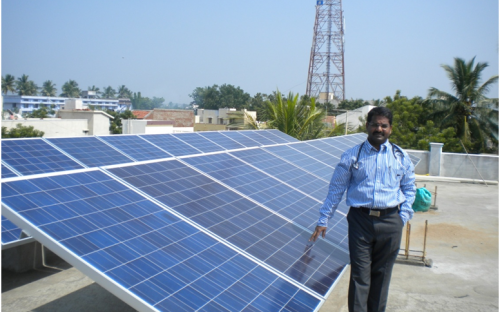Every MBA knows how difficult it is to finance start-ups and new business ventures.
So when Sujith Thannikkatt finished an MBA in the UK and landed a consulting role at a renewable energy company, it wasn't a complete surprise when the project went bust, and he was out of a job.
"With my connections and experience in India, I told them I could definitely help with their market entry into emerging markets," says Sujith from his new home in New Delhi.
"But the markets were looking bad. There was a lot of trouble in Europe at the time and then, in the middle of the project, they shelved the whole thing. It was a shock."
It's the last thing a newly-minted MBA wants. But in a way, you could say the economic instability gave Sujith the idea for his start-up. His current business of about two years, Longman Suntech Energy, is deep in the solar power industry, offering alternative energy solutions for residents in Mumbai & Chennai.
For a country whose energy consumption has been increasing at one of the fastest rates in the world, due to population growth and economic development, solar power in India is a bright business idea.
The company describes itself as "the pioneers of solar leasing in India", with a mission to accelerate the adoption of solar power in the emerging market.
When one door closed on Sujith's career, another opened. After gaining an MBA from the Lancaster University Management School, and after a quick end to his consulting career, he flew back to India, his home.
He was already in talks with his old engineering buddies about launching a new business, and when he touched base with them on Indian soil, a deal was struck.
Sujith started his career as a merchant navy officer, as an engineer, but switched paths to become something of an entrepreneur after sailing across the world - literally.
"We went around the country to find our market and after doing some hands-on research, we registered the firm and it was like we already had a business," he says.
Sujith and his co-founders have since been lighting up India for 21 months. But there are more problems to this concept than first meets the eye.
The firm's main competition is "conventional" energy sources. Coal currently accounts for around 55 per cent of the country's total energy supplies and, although there is increasing demand for energy in India, the government is somewhat slow at embracing change.
Sujith's start-up will really hit the wind when, he says, solar power costs less than conventional energy sources - what the industry calls grid-parity.
"The problem is, we achieved grid-parity years ago," Sujith explains. "But the government is subsidizing conventional power, which is one of the biggest reasons why solar energy is not taking off."
If that is their biggest challenge then Sujith's first business, Longman Engineers, was comparatively easy to establish.
He founded that company back in 2008 and began offering general engineering services. But as demand increased, he specialized in water-proofing commercial buildings - many of which are ageing badly in India, he says.
After a couple of years in business solo, his father joined the company. But when they tried to expand to other areas of India in 2009, Sujith was stumped.
"How do I recruit people? How to get someone in a different part of the country that I trust? How do I run that business remotely? I didn't really know," he explains.
"It was a rough year, with the financial crisis, and while it took time to hit the Indian market, getting finance to expand was really difficult. Every bank was skeptical. I thought maybe it was a good time to get a formal understanding of business."
An MBA was his way of becoming a better entrepreneur - although he wasn't confined to one career path. He applied to schools in the US, but during the financial crisis, everyone was applying to do MBAs there, Sujith says. Competition was fierce.
When he looked at schools in the UK, Lancaster, with its relatively high MBA Ranking, stood out. He received a scholarship to attend and after a few months on the program, developed an interest in consulting - a function that the b-school is famed for.
When he graduated in 2011, the jobs market was still tough. He found it hard to get employment in the UK and worked as a freelance consultant for a time. But an MBA certainly helped; he landed a project role at Centrica, a leading FTSE100 energy company - and his interest in the sector blossomed.
Flash forward to 2014 and the entrepreneur has no doubt that an MBA from Lancaster has made his solar start-up a success.
"The UK gave me the idea in the first place," he says. "But the MBA has given me managerial skills and the confidence to develop an idea, and approach investors.
"Three of my co-founders have MBAs, and I would say half of what we've achieved so far has been down to a business education. The idea of looking for business models around the world, seeking our opportunities and financing start-ups at a risky stage... I couldn't have done that without an MBA."
It's a tough world out there for solar power. And MBAs know start-ups are fraught with difficulty.
But something tells me Sujith won't be waiting for the government to level the playing field.
Student Reviews
Lancaster University Management School
RECAPTHA :
9b
7b
09
3b








